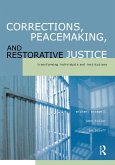Capital punishment policies in the USA are almost always justified by an individualistic belief in either rational choice or dispositional attribution, which justifies the death penalty either as a deterrent, or for retributive or incapacitative purposes. This book takes an in-depth look at the mitigation process and the use of individualism in the capital sentencing process. The work examines the use of individualistic (hegemonic) and contextualizing (subversive) discourses in the mitigation cases presented by capital defense attorneys and experts from trials in Delaware, and how these discourses were understood, interpreted, and utilized by jurors who served on those trials and by the judges who imposed the final sentences. This in-depth sociological examination of the use of individualizing and contextualizing accounts throughout the entire mitigation process helps to illuminate the challenges involved in structuring a death penalty that is not arbitrary in a culture that is overwhelmed by individualizing discourses, and thus struggles to account for the entrenched racial and economic inequality that is so conducive to lethal violence. In conclusion, it questions the entire premise of the Supreme Court's jurisprudence of death, which rests on a belief that the discretion of decision makers can be 'guided' in a way that accounts for contextualizing evidence and will reduce the death penalty's arbitrary and discriminatory application.
Dieser Download kann aus rechtlichen Gründen nur mit Rechnungsadresse in A, B, BG, CY, CZ, D, DK, EW, E, FIN, F, GR, HR, H, IRL, I, LT, L, LR, M, NL, PL, P, R, S, SLO, SK ausgeliefert werden.









